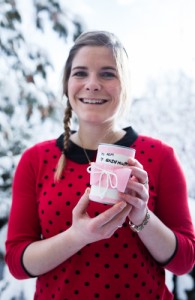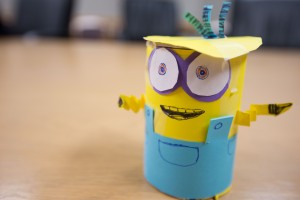
BYU’s Food Science Club is offering students an alternative Valentine gift: a can.
Valentine shoppers can stop by the Eyring Science Center and purchase “canned valentines” as a gift for a significant other.
How it works: Customers buy empty cans, they fill the cans with gifts, candy or notes and volunteers from the Food Science Club seal the cans. Customers then personalize their cans at a decorating station, and finally the cans are ready to give to loved ones.
Deb Hutchins, the club fundraising co-chair, said the process is simple and only takes five minutes, but people appreciate the gifts. She gave three or four cans last year and said the recipients loved them.
“They just thought it was super neat,” Hutchins said. “They were like, ‘I didn’t know you get to open it with a can opener.'”
The cans come in three different sizes, allowing for many sorts of gifts. One year, the volunteers watched as someone placed an engagement ring in a can.
Cameron Bardsley, president of the club, said his family took advantage of the fun last Valentine’s season.
“My dad last year gave my mom an iPhone 6 in one of those cans,” Bardsley said.
Cans cost $1, $3 or $5, depending on size. Buyers may also purchase candy and chocolate at the fundraiser or bring their own valentine gifts to lock away in the can. The Food Science Club provides decorating materials, but buyers are also welcome to decorate the cans on their own.
The fundraiser started Monday, Feb. 8 and goes until Friday in room S115 of the Eyring Science Center. The club will be open for business Monday and Tuesday from 10 a.m. to 1 p.m. and Wednesday through Friday from 9 a.m. to 5 p.m.

Bardsley said the club sold over 300 cans in recent years, and the club expects to sell even more this year.
Erin Hiatt, the other club fundraising co-chair, explained the club has provided the canned valentines for decades. They do it because it’s fun and seasonal, but it also helps teach people about food science and the food science major. Part of food science is canning, so the canned valentines are a great way to familiarize outsiders with food processing.
“It’s a way to make people aware what food science is because everyone thinks its nutrition or, like, eating healthy, and we’re not. We’re a separate entity,” Hiatt said.
Food science is an applied science, Bardsley explained. It includes manufacturing and processing food, and food science majors study chemistry, microbiology, physics and more. It’s a great major for pre-professionals and sets students up for good careers that will be there until people stop eating, according to Bardsley.
“If you look in your kitchens, if you look in your cupboards — food doesn’t grow on trees that way,” Hutchins said. “There’s a whole process and a lot of business that goes behind it and a lot of knowledge.”




